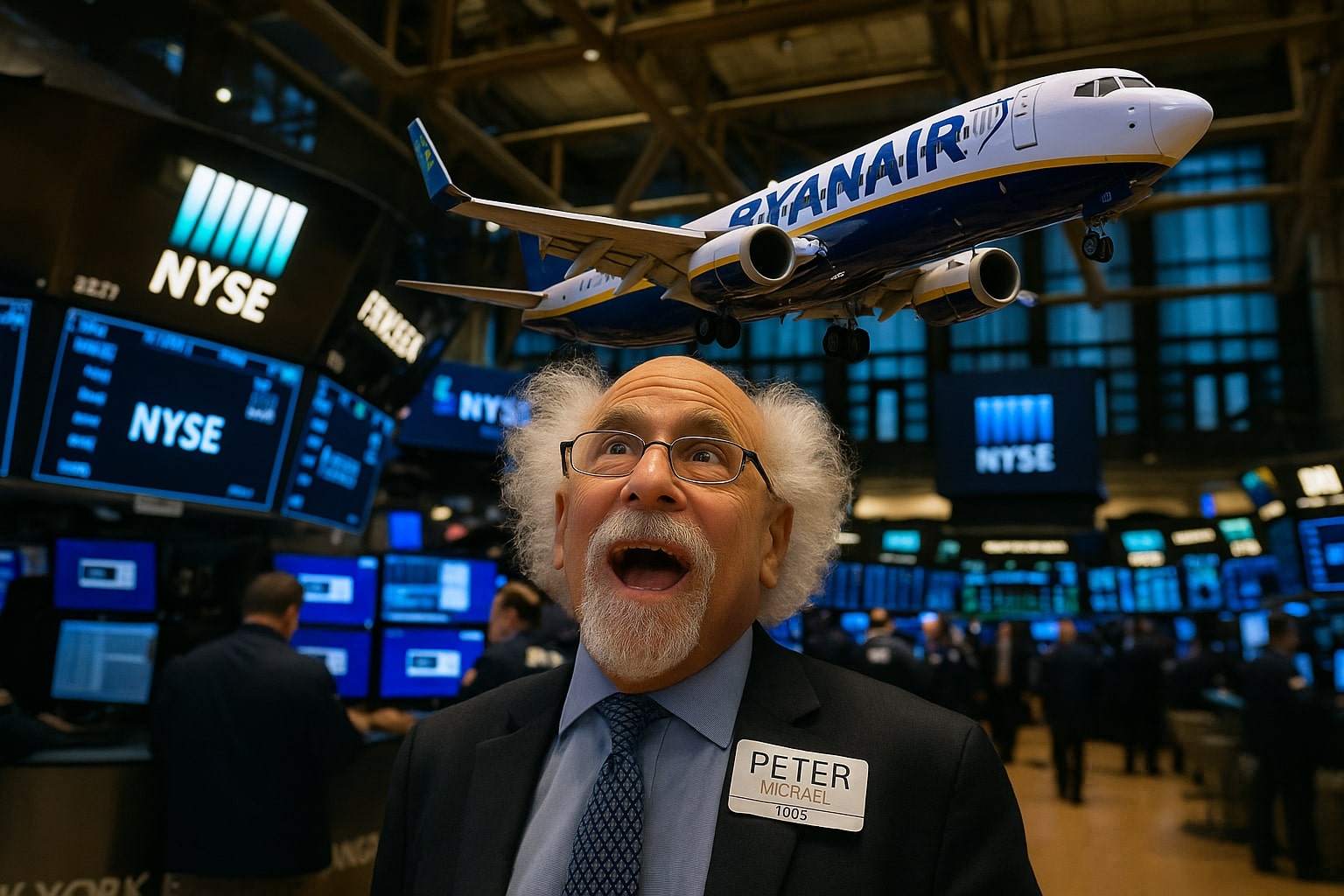
Trading News - U.S. Stock Futures Dive as Moody’s Downgrades U.S. Credit Rating and Global Trade War Heats Up
What’s driving the slide in U.S. futures, and how will the S&P 500, Nasdaq, and Dow Jones respond to the latest economic developments? | That's TradingNEWS
Market Overview: European and U.S. Indices Respond to Global Shifts
Global stock markets experienced significant volatility as U.S. credit rating downgrades and renewed concerns about U.S.-China trade tensions sent ripples through financial indices. As of May 19, 2025, European shares faced a downward push, opening in negative territory. The Stoxx 600 saw a decline of 0.4%, with Germany’s DAX and France's CAC 40 both experiencing losses. The FTSE 100, based in the U.K., similarly dropped by 0.5%. This pullback in European stocks came amidst a backdrop of trade truce optimism and disappointing economic data from China.
Volkswagen (VOW3) Faces Investor Backlash, Shares Drop 5%
Volkswagen (VOW3) shares plummeted by 5% in the morning trading session on May 19, 2025, driven by shareholder demands for a corporate restructuring. The German carmaker's AGM saw significant investor unrest, with discussions centered on how the company is managed amidst growing pressure to diversify and innovate. Despite these setbacks, Volkswagen's move into electric vehicles remains a key strength, and the company's future largely hinges on the adoption of the ID.3 electric car model. As of the latest update, Volkswagen stock is trading well below its previous highs, making it a stock to monitor in the coming weeks.
Prosus Bids for Just Eat Takeaway (JET) in a $4.1 Billion Deal
In a noteworthy development within the European tech sector, Prosus launched a €4.1 billion ($4.3 billion) bid for Just Eat Takeaway. The bid, priced at €20.30 per share, represents a premium of 63% over the food delivery giant's previous market price. This move reflects Prosus' ambition to expand its footprint in the competitive European tech landscape, specifically within the rapidly growing food delivery sector. The deal could provide Prosus with a significant leverage point in the European market, particularly in light of ongoing expansion in the AI and e-commerce sectors. However, the deal's success will be contingent on regulatory approvals and shareholder votes.
Gold Prices Rally After Moody's Downgrades U.S. Credit Rating
As global markets teeter on the edge of uncertainty, gold (GC=F) has proven to be a safe haven for investors. Following Moody's downgrade of the U.S. credit rating from Aaa to Aa1, gold prices surged, gaining as much as 1.3% to reach $3,245 an ounce in early trading on May 19, 2025. Investors turned to the precious metal, seeking stability amid growing concerns about the U.S. fiscal deficit and the broader economic outlook. Gold’s impressive year-to-date performance continues to attract capital inflows, particularly from exchange-traded funds (ETFs), making it a top pick for investors looking to hedge against inflation and geopolitical risk.
Ryanair (RYAAY) Reports Slumping Profits Amidst Growing Competition
Budget airline Ryanair (RYAAY) reported a 16% drop in full-year profits, despite a 4% increase in total revenue. The company’s profit after tax came in at €1.61 billion ($1.8 billion), slightly surpassing analysts' expectations of €1.6 billion. Ryanair’s struggle to maintain profitability is attributed to a 7% drop in average fares throughout 2024, which was offset by a 9% increase in passenger traffic. The airline’s ability to reduce operating costs while expanding its market share is critical as it faces growing competition from low-cost carriers across Europe. Ryanair’s strategy to navigate these turbulent times could provide insight into its future prospects.
U.S. Markets React to Moody’s Downgrade, Futures Show Early Decline
The credit rating downgrade of the U.S. by Moody's sent shockwaves through the stock market, with futures for the S&P 500, Dow Jones, and Nasdaq all showing significant declines in early trading. The Dow Jones futures dropped by 280 points, while the Nasdaq and S&P 500 futures fell by 165 points and 50 points, respectively. This shift in sentiment highlights the growing concern over the U.S. government's increasing budget deficit and the long-term implications of higher interest rates. Investors are now questioning the sustainability of the current market rally, particularly as U.S. economic growth faces headwinds from trade tensions and fiscal challenges.
Japan’s Topix Index Shows Resilience Amidst Global Uncertainty
Goldman Sachs analysts have raised their target for Japan’s Topix Index to 2,900, citing improved sentiment around risk-taking in the region. This upward adjustment comes as the Topix index saw gains over 13 consecutive sessions until mid-May, fueled by a temporary truce between the U.S. and China regarding tariffs. Despite these positive developments, concerns remain regarding the ongoing trade talks between Japan and the U.S. However, analysts remain bullish on Japan’s Topix index due to the country's solid economic fundamentals and the broader recovery in global risk appetite.
Xiaomi Invests Heavily in Chip Development to Boost Tech Dominance
In another notable move in the tech industry, Xiaomi (1810.HK) has announced plans to invest 50 billion yuan ($6.9 billion) over the next decade to develop its own mobile processor. This marks a significant step in the company's strategy to solidify its position in the semiconductor industry, which has become increasingly important for major tech companies. Xiaomi’s push into chip production follows in the footsteps of other tech giants like Apple (AAPL) and Samsung (005930.KS), who have invested heavily in their own chip development in recent years. Xiaomi’s decision to unveil its first self-designed processor, the Xring O1, is expected to be a key turning point in the company's efforts to enhance its hardware capabilities and reduce reliance on external suppliers.
U.S. and China’s Tariff Truce: What Does It Mean for Global Trade?
The temporary U.S.-China tariff truce has brought relief to markets, but it remains to be seen how long this optimism will last. With a 90-day pause in tariff increases, traders are hoping for a de-escalation of tensions that could positively impact global trade. However, the underlying issues surrounding intellectual property rights and market access are far from resolved, and the outcome of future negotiations could determine the course of the global economy. Market watchers are closely monitoring the situation as it unfolds, particularly in relation to the performance of the Nasdaq and S&P 500 indices, which have seen significant gains over the past week.
European Stocks Face Pressure Amid Economic Uncertainty
European stocks continue to grapple with economic uncertainty, as seen in the Stoxx 600 index, which opened 0.4% lower on Monday. While trade talks between the U.S. and China have temporarily alleviated some market fears, broader concerns about inflation and monetary policy continue to weigh on investor sentiment. As Volkswagen (VOW3) faces investor unrest, and Prosus bids for Just Eat Takeaway (JET), the European market's resilience will be tested by these corporate developments and the ongoing regulatory challenges in the region. The broader economic landscape remains uncertain, with the possibility of further volatility as geopolitical tensions and trade issues continue to evolve.
Inflation Concerns and Market Sentiment Shift: The Impact on Gold and Commodities
With inflationary pressures resurging and a potential slowdown in global economic growth, gold prices are witnessing increased demand. The precious metal recently rose to $3,245 per ounce, driven by concerns over the U.S. credit downgrade and persistent trade uncertainties. As gold continues to benefit from haven demand, its volatility is likely to persist, with investors seeking safety in the face of inflation risks. Meanwhile, oil prices have been more volatile, with concerns over global supply chains and trade tensions pushing Brent crude and WTI to fluctuate in early trading this week.
Key Insights for Investors: What’s Next for European and U.S. Markets?
As global market conditions continue to shift, investors must closely watch the evolving dynamics between U.S. fiscal policies, China’s economic performance, and corporate earnings reports from key players like Target (TGT), Home Depot (HD), and Workday (WDAY). The next few weeks will be crucial for determining the direction of the market, especially as uncertainty around interest rates, trade negotiations, and tariff policies remain front and center in market participants’ minds. The U.S. market's response to these factors, combined with the performance of European stocks, will shape the trajectory for global equities in the near term.
The interplay between monetary policy, corporate earnings, and global trade dynamics will remain key drivers of market performance in the coming months. As we move forward, investors will need to remain vigilant and adaptable to shifting market conditions to navigate this unpredictable environment.
That's TradingNEWS
Read More
-
GPIQ ETF Price Forecast: Can a 10% Yield at $52 Survive the Next Nasdaq Selloff?
09.02.2026 · TradingNEWS ArchiveStocks
-
XRP ETF Price Forecast: XRPI at $8.32, XRPR at $11.86 as $44.95M Inflows Defy BTC and ETH Outflows
09.02.2026 · TradingNEWS ArchiveCrypto
-
Natural Gas Futures Price Forecast: Will The $3.00 Floor Hold After The $7 Winter Spike?
09.02.2026 · TradingNEWS ArchiveCommodities
-
Stock Market Today: Dow Back Under 50K While S&P 500 and Nasdaq Push Higher as Gold Reclaims $5,000
09.02.2026 · TradingNEWS ArchiveMarkets
-
USD/JPY Price Forecast: Can Bulls Clear 157.5 Without Triggering a 160 Intervention Line?
09.02.2026 · TradingNEWS ArchiveForex


















